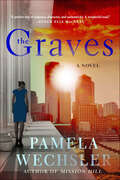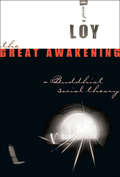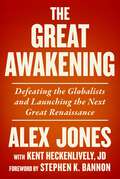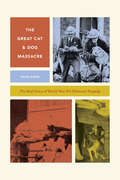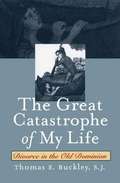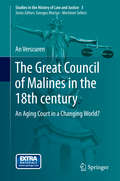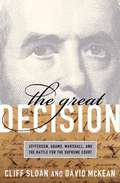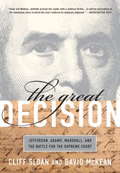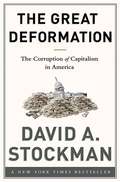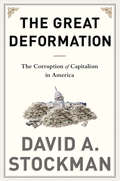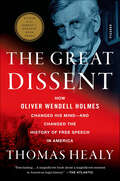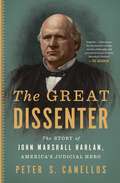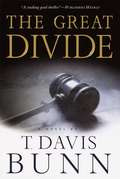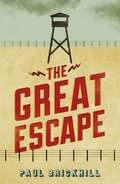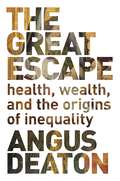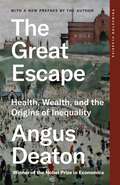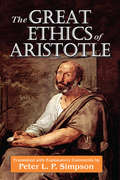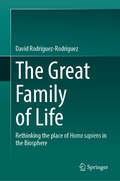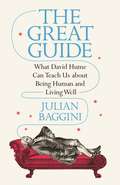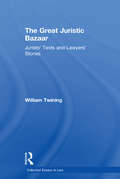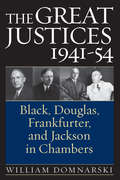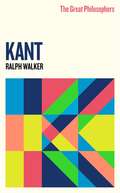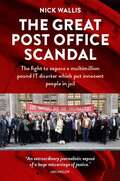- Table View
- List View
The Graves: A Novel (The Abby Endicott Novels #2)
by Pamela WechslerAbby Endicott, the chief of the District Attorney’s homicide unit in Boston, returns in the heart-racing follow-up to Mission Hill. Things are looking good for Abby: she’s top pick to be the next District Attorney, and her musician boyfriend Ty has moved in, despite her upper crust family’s objections. But a serial killer is on the loose, and with two college-aged girls dead and another missing, time is running out. When the sons of a prominent government official are linked to the murders, Abby pushes back, stopping at nothing to find justice for the girls. This time, the killer could be right under her nose, and she may be the next victim.In The Graves, former prosecutor turned television writer Pamela Wechsler delivers a tense and enthralling Boston-set thriller about the intersection of power, privilege, and justice.
The Great Awakening
by David R. LoyThe most essential insight that Buddhism offers is that all our individual suffering arises from three and only three sources, known in Buddhism as the three poisons: greed, ill-will, and delusion. In The Great Awakening, scholar and Zen teacher David Loy examines how these three poisons, embodied in society's institutions, lie at the root of all social maladies as well. The teachings of Buddhism present a way that the individual can counteract these to alleviate personal suffering, and in the The Great Awakening Loy boldly examines how these teachings can be applied to institutions and even whole cultures for the alleviation of suffering on a collective level. This book will help both Buddhists and non-Buddhists to realize the social importance of Buddhist teachings, while providing a theoretical framework for socially engaged members of society to apply their spiritual principles to collective social issues. The Great Awakening shows how Buddhism can help our postmodern world develop liberative possibilities otherwise obscured by the anti-religious bias of so much contemporary social theory.
The Great Awakening: Defeating the Globalists and Launching the Next Great Renaissance
by Kent Heckenlively Alex JonesIn The Great Awakening: Defeating the Globalists and Launching the Next Great Renaissance, the most persecuted man on Earth, Alex Jones, gives you the good news about the failing plans of the globalists to control humanity. The expression &“Get woke, go broke&” has entered the common lexicon as we&’ve seen company after company invoke the false gods of diversity, equity, and inclusion to their financial demise. But this surface discussion masks a much darker truth. What we are witnessing is nothing less than the failed plans of social Darwinists to capture free market capitalism and turn it toward their fascist aims of controlling and depopulating the globe. Working with New York Times bestselling author Kent Heckenlively, Jones masterfully gives you the deeper discussion about such hot button topics as the truth behind the globalists plans for artificial intelligence (AI), the central bank digital currency, social credit scores, Big Tech tyranny, censorship, fifteen-minute cities, the unholy alliance between big business and big government, the military-intelligence-industrial complex—which is hell-bent on eternal war—and the all-out assault on free speech and the Second Amendment. The good news is that these plans are destined to fail, if we wake up to the anti-human future the globalists have planned for us. The globalists hate freedom, and what they hate the most is the greatest freedom document in human history, the United States Constitution. Jones does not shy away from the darker parts of American history—the way we have been systematically deceived by the intelligence agencies since their assassination of President John F. Kennedy—but he provides example after example of people who have broken free from the matrix of lies to tell the truth. The people the globalists fear the most are the members of their own systems of control, who wake up and then decide to act against the machine. The globalists believe they&’ve planned for every possible contingency, but they hadn&’t counted on the conscience and love of truth, which lives in the souls of good people. St. Augustine once wrote: &“The truth is like a lion; you don&’t have to defend it. Let it loose; it will defend itself.&” No figure in our modern times has roared louder against the enemies of freedom than Alex Jones. In the calm and dispassionate style that made his first book, The Great Reset: And the War for the World, such a smash hit, Alex lays out the flaws in the plans of the globalists and how they seek to create a world in direct opposition to God&’s plans for our glorious human future. But God consistently works His will in our world, even through imperfect individuals like Donald Trump, Alex Jones, or you. If you want to read one book this year to understand your world and help lead humanity to the next great human renaissance, you need to order this book today.
The Great Cat and Dog Massacre: The Real Story of World War Two's Unknown Tragedy (Animal Lives Ser.)
by Hilda KeanThe tragedies of World War II are well known. But at least one has been forgotten: in September 1939, four hundred thousand cats and dogs were massacred in Britain. The government, vets, and animal charities all advised against this killing. So why would thousands of British citizens line up to voluntarily euthanize household pets? In The Great Cat and Dog Massacre, Hilda Kean unearths the history, piecing together the compelling story of the life—and death—of Britain’s wartime animal companions. She explains that fear of imminent Nazi bombing and the desire to do something to prepare for war led Britons to sew blackout curtains, dig up flower beds for vegetable patches, send their children away to the countryside—and kill the family pet, in theory sparing them the suffering of a bombing raid. Kean’s narrative is gripping, unfolding through stories of shared experiences of bombing, food restrictions, sheltering, and mutual support. Soon pets became key to the war effort, providing emotional assistance and helping people to survive—a contribution for which the animals gained government recognition. Drawing extensively on new research from animal charities, state archives, diaries, and family stories, Kean does more than tell a virtually forgotten story. She complicates our understanding of World War II as a “good war” fought by a nation of “good” people. Accessibly written and generously illustrated, Kean’s account of this forgotten aspect of British history moves animals to center stage—forcing us to rethink our assumptions about ourselves and the animals with whom we share our homes.
The Great Catastrophe of My Life
by Thomas E. BuckleyFrom the end of the Revolution until 1851, the Virginia legislature granted most divorces in the state. It granted divorces rarely, however, turning down two-thirds of those who petitioned for them. Men and women who sought release from unhappy marriages faced a harsh legal system buttressed by the political, religious, and communal cultures of southern life. Through the lens of this hostile environment, Thomas Buckley explores with sympathy the lives and legal struggles of those who challenged it.Based on research in almost 500 divorce files, The Great Catastrophe of My Life involves a wide cross-section of Virginians. Their stories expose southern attitudes and practices involving a spectrum of issues from marriage and family life to gender relations, interracial sex, adultery, desertion, and domestic violence. Although the oppressive legal regime these husbands and wives battled has passed away, the emotions behind their efforts to dissolve the bonds of marriage still resonate strongly.
The Great Council of Malines in the 18th century
by An VerscurenThis work studies the Great Council of Malines as an institution. It analyzes the Council's internal organization and staff policy, its position within the broader society of the Austrian Netherlands, the volume and nature of litigation at the Council and its final years and ultimate demise in the late 18th and early 19th century. By means of this institutional study, this volume provides insight into the role played by the Great Council in the process of state-building in the 18th century Austrian Netherlands. While superior courts were once considered to be the prime agencies of change in the Early Modern Period, tools par excellence for the sovereigns' striving towards centralization and superiority, their position in the 18th century has so far been barely touched upon. This work focuses specifically on the 18th century supreme court of the Austrian Netherlands and provides a broad overview with attention to other aspects of the tribunal's functioning and to its role in 18th century attempts at state formation.
The Great Decision: Jefferson, Adams, Marshall, and the Battle for the Supreme Court
by Cliff Sloan David Mckean"The Great Decision" tells the riveting story of John Marshall and of the landmark court case that not only empowered the Supreme Court, but also transformed the idea of the separation of powers into a working blueprint for America's modern state.
The Great Decision: Jefferson, Adams, Marshall, and the Battle for the Supreme Court
by Cliff Sloan David MckeanIn 1800, the United States teetered on the brink of a second revolution. The presidential election between Adams and Jefferson was a bitterly contested tie, and the government neared collapse. The Supreme Court had no clear purpose or power-no one had even thought to build it a courtroom in the new capital city. When Adams sought to prolong his policies in defiance of the electorate by packing the courts, the fine words of the new Constitution could do nothing to stop him. It would take a man to make those words good, and America found him in John Marshall. The Great Decisiontells the riveting story of Marshall and of the landmark court case,Marbury v. Madison, through which he empowered the Supreme Court and transformed the idea of the separation of powers into a working blueprint for our modern state. Rich in atmospheric detail, political intrigue, and fascinating characters,The Great Decisionis an illuminating tale of America’s formative years and of the evolution of our democracy.
The Great Deformation: The Corruption of Capitalism in America
by David A. StockmanA "New York Times" bestseller "The Great Deformation" is a searing look at Washington's craven response to the recent myriad of financial crises and fiscal cliffs. It counters conventional wisdom with an eighty-year revisionist history of how the American state--especially the Federal Reserve--has fallen prey to the politics of crony capitalism and the ideologies of fiscal stimulus, monetary central planning, and financial bailouts. These forces have left the public sector teetering on the edge of political dysfunction and fiscal collapse and have caused Americas private enterprise foundation to morph into a speculative casino that swindles the masses and enriches the few. Defying right- and left-wing boxes, David Stockman provides a catalogue of corrupters and defenders of sound money, fiscal rectitude, and free markets. The former includes Franklin Roosevelt, who fathered crony capitalism; Richard Nixon, who destroyed national financial discipline and the Bretton Woods gold-backed dollar; Fed chairmen Greenspan and Bernanke, who fostered our present scourge of bubble finance and addiction to debt and speculation; George W. Bush, who repudiated fiscal rectitude and ballooned the warfare state via senseless wars; and Barack Obama, who revived failed Keynesian "borrow and spend" policies that have driven the national debt to perilous heights. By contrast, the book also traces a parade of statesmen who championed balanced budgets and financial market discipline including Carter Glass, Harry Truman, Dwight Eisenhower, Bill Simon, Paul Volcker, Bill Clinton, and Sheila Bair. Stockmans analysis skewers Keynesian spenders and GOP tax-cutters alike, showing how they converged to bloat the welfare state, perpetuate the military-industrial complex, and deplete the revenue base--even as the Feds massive money printing allowed politicians to enjoy "deficits without tears. " But these policies have also fueled new financial bubbles and favored Wall Street with cheap money and rigged stock and bond markets, while crushing Main Street savers and punishing family budgets with soaring food and energy costs. "The Great Deformation" explains how we got here and why these warped, crony capitalist policies are an epochal threat to free market prosperity and American political democracy.
The Great Deformation: The Corruption of Capitalism in America
by David A. StockmanA New York Times bestseller The Great Deformation is a searing look at Washington’s craven response to the recent myriad of financial crises and fiscal cliffs. It counters conventional wisdom with an eighty-year revisionist history of how the American state-especially the Federal Reserve-has fallen prey to the politics of crony capitalism and the ideologies of fiscal stimulus, monetary central planning, and financial bailouts. These forces have left the public sector teetering on the edge of political dysfunction and fiscal collapse and have caused America’s private enterprise foundation to morph into a speculative casino that swindles the masses and enriches the few. Defying right- and left-wing boxes, David Stockman provides a catalogue of corrupters and defenders of sound money, fiscal rectitude, and free markets. The former includes Franklin Roosevelt, who fathered crony capitalism; Richard Nixon, who destroyed national financial discipline and the Bretton Woods gold-backed dollar; Fed chairmen Greenspan and Bernanke, who fostered our present scourge of bubble finance and addiction to debt and speculation; George W. Bush, who repudiated fiscal rectitude and ballooned the warfare state via senseless wars; and Barack Obama, who revived failed Keynesian "borrow and spend” policies that have driven the national debt to perilous heights. By contrast, the book also traces a parade of statesmen who championed balanced budgets and financial market discipline including Carter Glass, Harry Truman, Dwight Eisenhower, Bill Simon, Paul Volcker, Bill Clinton, and Sheila Bair. Stockman’s analysis skewers Keynesian spenders and GOP tax-cutters alike, showing how they converged to bloat the welfare state, perpetuate the military-industrial complex, and deplete the revenue base-even as the Fed’s massive money printing allowed politicians to enjoy "deficits without tears. ” But these policies have also fueled new financial bubbles and favored Wall Street with cheap money and rigged stock and bond markets, while crushing Main Street savers and punishing family budgets with soaring food and energy costs. The Great Deformation explains how we got here and why these warped, crony capitalist policies are an epochal threat to free market prosperity and American political democracy.
The Great Dissent: How Oliver Wendell Holmes Changed His Mind—and Changed the History of Free Speech in America
by Thomas HealyA Kirkus Reviews Best Nonfiction Book of the Year: “Fascinating . . . A magnificent book about a magnificent moment in American legal history.” —The AtlanticA Winner of the Robert F. Kennedy Book AwardNo right seems more fundamental to American public life than freedom of speech. Yet well into the twentieth century, that freedom was still an unfulfilled promise, with Americans regularly imprisoned merely for speaking out against government policies. Indeed, free speech as we know it comes less from the First Amendment than from a most unexpected source: Supreme Court justice Oliver Wendell Holmes. A lifelong skeptic, he disdained individual rights, including the right to express one’s political views. But in 1919, it was Holmes who wrote a dissenting opinion that would become the canonical affirmation of free speech in the United States.Why did Holmes change his mind? That question has puzzled historians for almost a century. Now, with the aid of newly discovered letters and confidential memos, law professor Thomas Healy reconstructs in vivid detail Holmes’s journey from free-speech opponent to First Amendment hero. It is the story of a remarkable behind-the-scenes campaign by a group of progressives to bring a legal icon around to their way of thinking—and a deeply touching human narrative of an old man saved from loneliness and despair by a few unlikely young friends.Beautifully written and exhaustively researched, The Great Dissent is intellectual history at its best, revealing how free debate can alter the life of a man and the legal landscape of an entire nation.“Compelling [and] charming.” —The Wall Street Journal“A beautifully written history, capturing the lively and passionate debate as Holmes came to see the abiding imperative of free speech and defend it at great cost to his own reputation at the time.” —Booklist“A stirring mix of intelligent biography and truly significant social and legal history.” —TheChristian Science Monitor
The Great Dissenter: The Story of John Marshall Harlan, America's Judicial Hero
by Peter S. CanellosThe definitive, sweeping biography of an American hero who stood against all the forces of Gilded Age America to fight for civil rights and economic freedom: Supreme Court Justice John Marshall Harlan.They say that history is written by the victors. But not in the case of the most famous dissenter on the Supreme Court. Almost a century after his death, it was John Marshall Harlan&’s words that helped end segregation, and gave us our civil rights and our modern economic freedom. But his legacy would not have been possible without the courage of Robert Harlan, a slave who John&’s father raised like a son in the same household. After the Civil War, Robert emerges as a political leader. With Black people holding power in the Republican Party, it is Robert who helps John land his appointment to the Supreme Court. At first, John is awed by his fellow justices, but the country is changing. Northern whites are prepared to take away black rights to appease the South. Giant trusts are monopolizing entire industries. Against this onslaught, the Supreme Court seemed all too willing to strip away civil rights and invalidate labor protections. As case after case comes before the court, challenging his core values, John makes a fateful decision: He breaks with his colleagues in fundamental ways, becoming the nation&’s prime defender of the rights of Black people, immigrant laborers, and people in distant lands occupied by the United States. Harlan&’s dissents, particularly in Plessy v. Ferguson, were widely read and a source of hope for decades. Thurgood Marshall called Harlan&’s Plessy dissent his &“Bible&”—and his legal roadmap to overturning segregation. In the end, Harlan&’s words built the foundations for the legal revolutions of the New Deal and Civil Rights eras. Spanning from the Civil War to the Civil Rights movement and beyond, The Great Dissenter is an epic rendering of the American legal system&’s greatest failures and most inspiring successes.
The Great Divide
by T. Davis BunnWhen attorney Marcus Glenwood resigns from a prestigious corporate law firm to retreat to a small town in North Carolina and rebuild his life after a devastating personal tragedy, he suddenly finds himself in the biggest and most emotionally difficult case of his career.Fragile and spiritually wounded, Glenwood is introduced to Alma and Austin Hall, whose daughter Gloria has disappeared in China while investigating the slave-like practices of New Horizons, the world's largest manufacturer of sports shoes and athletic gear. Persuaded by Alma's pleading, and their obvious distress, Marcus accepts the case.No one, including Marcus himself, can believe how quickly his investigation untangles a web of deceit that stretches from Washington , D.C., to Europe and Asia and back to his own North Carolina backyard. With the power to obstruct, manipulate, intimidate, injure, and eliminate, the giant multinational sports company New Horizons has never lost a case. But they underestimate Marcus Glenwood.Step by cautious step Glenwood moves forward to uncover the horrifying truth about New Horizons, Gloria Hall, and ultimately himself.From the Trade Paperback edition.
The Great Escape (CASSELL MILITARY PAPERBACKS)
by Paul BrickhillThe famous story of mass escape from a WWII German PoW camp that inspired the classic film.One of the most famous true stories from the last war, The GREAT ESCAPE tells how more than six hundred men in a German prisoner-of-war camp worked together to achieve an extraordinary break-out. Every night for a year they dug tunnels, and those who weren't digging forged passports, drew maps, faked weapons and tailored German uniforms and civilian clothes to wear once they had escaped. All of this was conducted under the very noses of their prison guards. When the right night came, the actual escape itself was timed to the split second - but of course, not everything went according to plan...
The Great Escape (W&N Military)
by Paul BrickhillThe famous story of mass escape from a WWII German PoW camp that inspired the classic film.One of the most famous true stories from the last war, The GREAT ESCAPE tells how more than six hundred men in a German prisoner-of-war camp worked together to achieve an extraordinary break-out. Every night for a year they dug tunnels, and those who weren't digging forged passports, drew maps, faked weapons and tailored German uniforms and civilian clothes to wear once they had escaped. All of this was conducted under the very noses of their prison guards. When the right night came, the actual escape itself was timed to the split second - but of course, not everything went according to plan...
The Great Escape: Health, Wealth, and the Origins of Inequality
by Angus DeatonA Nobel Prize–winning economist tells the remarkable story of how the world has grown healthier, wealthier, but also more unequal over the past two and half centuriesThe world is a better place than it used to be. People are healthier, wealthier, and live longer. Yet the escapes from destitution by so many has left gaping inequalities between people and nations. In The Great Escape, Nobel Prize–winning economist Angus Deaton—one of the foremost experts on economic development and on poverty—tells the remarkable story of how, beginning 250 years ago, some parts of the world experienced sustained progress, opening up gaps and setting the stage for today's disproportionately unequal world. Deaton takes an in-depth look at the historical and ongoing patterns behind the health and wealth of nations, and addresses what needs to be done to help those left behind.Deaton describes vast innovations and wrenching setbacks: the successes of antibiotics, pest control, vaccinations, and clean water on the one hand, and disastrous famines and the HIV/AIDS epidemic on the other. He examines the United States, a nation that has prospered but is today experiencing slower growth and increasing inequality. He also considers how economic growth in India and China has improved the lives of more than a billion people. Deaton argues that international aid has been ineffective and even harmful. He suggests alternative efforts—including reforming incentives to drug companies and lifting trade restrictions—that will allow the developing world to bring about its own Great Escape.Demonstrating how changes in health and living standards have transformed our lives, The Great Escape is a powerful guide to addressing the well-being of all nations.
The Great Escape: Health, Wealth, and the Origins of Inequality (Princeton Classics #136)
by Angus DeatonA Nobel Prize–winning economist tells the remarkable story of how the world has grown healthier, wealthier, but also more unequal over the past two and half centuriesThe world is a better place than it used to be. People are healthier, wealthier, and live longer. Yet the escapes from destitution by so many has left gaping inequalities between people and nations. In The Great Escape, Nobel Prize–winning economist Angus Deaton—one of the foremost experts on economic development and on poverty—tells the remarkable story of how, beginning 250 years ago, some parts of the world experienced sustained progress, opening up gaps and setting the stage for today's disproportionately unequal world. Deaton takes an in-depth look at the historical and ongoing patterns behind the health and wealth of nations, and addresses what needs to be done to help those left behind.Deaton describes vast innovations and wrenching setbacks: the successes of antibiotics, pest control, vaccinations, and clean water on the one hand, and disastrous famines and the HIV/AIDS epidemic on the other. He examines the United States, a nation that has prospered but is today experiencing slower growth and increasing inequality. He also considers how economic growth in India and China has improved the lives of more than a billion people. Deaton argues that international aid has been ineffective and even harmful. He suggests alternative efforts—including reforming incentives to drug companies and lifting trade restrictions—that will allow the developing world to bring about its own Great Escape.Demonstrating how changes in health and living standards have transformed our lives, The Great Escape is a powerful guide to addressing the well-being of all nations.
The Great Ethics of Aristotle
by Peter L. SimpsonIn this follow up to The Eudemian Ethics of Aristotle, Peter L. P. Simpson centres his attention on the basics of Aristotelian moral doctrine as found in the Great Ethics: the definition of happiness, the nature and kind of the virtues, pleasure, and friendship. This work's authenticity is disputed, but Simpson argues that all the evidence favours it. Unlike the Nicomachean and Eudemian Ethics, Aristotle wrote the Great Ethics for a popular audience. It gives us insight less into Aristotle the theoretician than into Aristotle the pedagogue. For this reason, the Great Ethics has distinct advantages as an introduction to Aristotelian ethical thinking: it is simpler and clearer in its argumentation, matters such as the intellectual virtues are made suitably secondary to the practical focus, the moral virtues come through with a pleasing directness, and the work's syllogistic formalism gives it a transparency and accessibility that the other Ethics typically lack. Arius' Epitome, which relies heavily on this work, helps confirm its value and authenticity. Because the Great Ethics is generally neglected by scholars, less has been done to clear up its obscurities or to expose its structure. But to ignore it is to lose another and more instructive way of approaching and appreciating Aristotle's teaching. The translation is prefaced by an analytic outline of the whole, and the several sections of it are prefaced by brief summaries. The commentary supplies fuller descriptions and analyses, sorting out puzzles, removing misunderstandings, and resolving doubts of meaning and intention. This book is a fresh rendition of the work of the preeminent philosopher of all time.
The Great Family of Life: Rethinking the place of Homo sapiens in the Biosphere
by David Rodríguez-RodríguezThis book explains the causes, consequences and desirable solutions to the unbalanced and unfair relationship between Homo sapiens and the other species that inhabit Planet Earth in a succinct, enjoyable and thought-provoking way. Major sociological, economic, political, educational, religious and phylosophical perspectives are reviewed in order to understand why we have reached the current alarming status of global biodiversity during the Anthropocene, and how we can react to it to attain not just human welfare, but global happiness. The target audience is wide, from the general public interested in the deep inner causes of environmental degradation, to college and university students and lecturers, notably in the fields of environmental ethics, environmental philosophy, environmental law and environmental politics.
The Great Guide: What David Hume Can Teach Us about Being Human and Living Well
by Julian BagginiInvaluable wisdom on living a good life from one of the Enlightenment's greatest philosophersDavid Hume (1711–1776) is perhaps best known for his ideas about cause and effect and his criticisms of religion, but he is rarely thought of as a philosopher with practical wisdom to offer. Yet Hume's philosophy is grounded in an honest assessment of nature—human nature in particular. The Great Guide is an engaging and eye-opening account of how Hume's thought should serve as the basis for a complete approach to life.In this enthralling book, Julian Baggini masterfully interweaves biography with intellectual history and philosophy to give us a complete vision of Hume's guide to life. He follows Hume on his life's journey, literally walking in the great philosopher's footsteps as Baggini takes readers to the places that inspired Hume the most, from his family estate near the Scottish border to Paris, where, as an older man, he was warmly embraced by French society. Baggini shows how Hume put his philosophy into practice in a life that blended reason and passion, study and leisure, and relaxation and enjoyment.The Great Guide includes 145 Humean maxims for living well, on topics ranging from the meaning of success and the value of travel to friendship, facing death, identity, and the importance of leisure. This book shows how life is far richer with Hume as your guide.
The Great Juristic Bazaar: Jurists' Texts and Lawyers' Stories (Collected Essays In Law Ser.)
by William TwiningSome law students find jurisprudence daunting, impersonal, dry and seemingly detached from practical affairs. William Twining believes that many jurists have been fascinating people struggling with questions that are both historically significant and relevant to contemporary issues. This book brings together previously published essays that centre on three related themes: reading Juristic texts, the role of narrative in law, and relations between theory and practice. Building on a pragmatic view of jurisprudence, the author explores different ways of reading and using Juristic texts, to set them in context, to bring them to life and to engage with the reader's own concerns. He applies this approach to throw fresh light on four familiar figures - Holmes, Bentham, Hart and Llewellyn. Challenging limited agendas and parochial points of view, Twining outlines a programme for a broad approach to legal theory in the context of globalization. He satirizes some bad habits in jurisprudence and explores in depth how stories can be seductive vehicles for cheating in legal contexts, yet are essential for making sense of disputes about fact or law.
The Great Justices 1941-54
by William DomnarskiDomnarski is a practicing intellectual property attorney in California and the author of a previous book on the history and nature of federal court judicial opinions. In this text, the author compares four brilliant and diverse jurists of the Roosevelt-era Court--Hugo Black, William O. Douglas, Felix Frankfurter, and Robert Jackson--during the period from 1941 to 1954. The study explores the Court's evolving civil rights jurisprudence that was born in the period during which the four justices served together, considers the Court as an institution and its relation to the American public, and analyzes how four individual justices sharing core jurisprudential beliefs and ambitions before appointment would later divide into competing liberal and conservative factions. Annotation ©2006 Book News, Inc. , Portland, OR (booknews. com)
The Great Leveler: Capitalism and Competition in the Court of Law
by Brett ChristophersBrett Christophers shows how laws help capitalism maintain a crucial balance between competition and monopoly. When monopolistic forces dominate, antitrust law discourages the growth of corporations and restores competitiveness. When competition becomes dominant, intellectual property law protects corporate assets and encourages investment.
The Great Philosophers:Kant (GREAT PHILOSOPHERS)
by Ralph Walker'Happiness is not an ideal of reason, but of imagination.' KantIn today's increasingly fractured world of oppression and uncertainty, Kant's moral philosophy is more important than ever before. And never has the need for moral absolutes been more pressing than in this age of doubt, disillusion and cynicism. This is where Kant comes in, as his moral philosophy continues to compel the attention of every serious thinker in the field. Clear, concise - and overwhelmingly convincing - Ralph Walker's stimulating, highly accessible guide spells out the power and renewed relevance of his thinking: a genuinely objective, absolute basis for a modern moral law.
The Great Post Office Scandal: The fight to expose a multimillion pound IT disaster which put innocent people in jail
by Nick WallisIn 1999 the British Post Office installed an unreliable computer system to track the financial transactions in its small post offices throughout England. Immediately the system began turning up large financial losses, indicating missing cash. The operators (sub-postmasters) and their employees were accused of theft. They were considered to be guilty and because they could not access the computer system which the government deemed to be perfect, they could not prove their innocence. Several were imprisoned, many lost their jobs and a couple of them committed suicide. Most suffered disgrace in their communities. They sometimes lost their homes and their finances were often in ruins. This book tells some of their stories and whether they were able to get redress. It describes in detail the operation of the British legal system and the behavior of numerous government officials. There is a BBC podcast called "The Great Post Office Trial" where you can hear some of the voices of the people presented in this book. It has 19 episodes.
